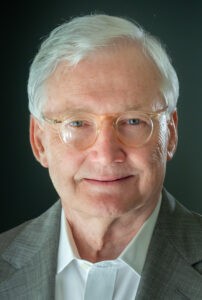“Stampede” may be an exaggerated word for the exodus out of the church in America, but no one can escape the reality. A date has been attached: 2070, the projected date when there will be more non-Christians than Christians in our nation. How are we to respond to this trend? The numbers of people leaving church or opting out of church are accelerating.
This trend has caught the attention of both the religious and secular press. A recent and much-read op-ed in the Washington Post by one of its younger writers, Perry Bacon Jr., is a case in point. It’s title, “I Left the Church — And Now Long for A Church for the Nones.”

Stephen Shoemaker
The nones are those who identify as religiously non-affiliated in surveys. Most of these once were churchgoers. They are the fastest growing group in surveys on religion in America, up from about 5% in the 1990s to 30% today. About 40 million Americans do not attend church who used to do so.
Perry Bacon longs for a church for the nones. I think we can help create spaces where the nones can gather and share their spiritual journey. Our church is collaborating with the Iredell Arts Council to create a series of evenings at their performance space to bring in artists of all kinds to perform or display their art and talk about the connection of art and faith in their work — and have conversation with the audience.
What are we to think of this exodus out of church? We all can think of some reasons why:
- Those who have been hurt in church. I call them “burn victims.”
- The sexual child abuse crisis in the church to which the church has been slow, even criminally so, to take seriously.
- There are the 40% of young people, ages 18 to 29, who are nones, many disillusioned by the church for a variety of reasons. The editor of Christianity Today, Russell Moore, has said it well: The reason young people are leaving the church is not because they don’t believe what the church teaches but because the church does not believe what the church teaches.
- Some are leaving because of the racial attitudes in church. Robert P. Jones has documented in surveys and research that the white church in America has been and still is an incubator of white supremacy.
- And we could add the denunciation of LGBTQ persons in churches. Many young people will have none of this. I remember talking to a young adult who said she no longer went to church. I said to her, “I bet there are good reasons for that.” She teared up, and thus began a friendship that helped her find her way back to church. We need to be honest and affirming to people who have left the church.
But I want also to probe the issues of Christian spirituality outside the walls of the church. Early in Christian history a doctrine was born, begun by St. Cyprian of Carthage in the third century: “There is no salvation outside the church.”
We might begin a long conversation on: What is church, what is salvation and what is “inside” and “outside”?
In 1442, the Council of Florence ratified this idea as official church doctrine. Here is what they said: “The Holy Roman Church … firmly believes, acknowledges and proclaims that ‘no one outside the Catholic Church,’ neither heathen nor Jew nor unbeliever, nor anyone separated from the unity (that is, all those tossed out of the church) will partake of eternal life, but will rather fall victim to the everlasting fire prepared for the devil and his angels.”
It reads no better in the original Latin.
The Second Vatican Council in the 1960s, notable for its progressive documents, amended this fierce doctrine by saying “all men of good will can attain salvation,” including Jews, Muslims and Christians of other denominations. You would not be surprised to know the Second Vatican Council has been largely denounced by growing conservative forces in the Roman Catholic Church.
“I want to take seriously the spirituality of those outside the church and outside the category of religious faith and belief.”
Baptists have returned the insult. When I was growing up in Southern Baptist life, Catholics were seen as those not saved and going to hell. We sent missionaries to Catholic countries to save Catholics from damnation, and Catholics were targets of our evangelism here at home.
But I want to take seriously the spirituality of those outside the church and outside the category of religious faith and belief. There are former Christians and former churchgoers who are deeply spiritual. Some are dedicated followers of Jesus in their own way. Some have found the spirituality of other religions most compelling to them. There are agnostics and atheists whose moral and ethical lives are superior to mine. Many have argued that one has to have God to be good. That has been far from my experience, and most probably yours as well.
In Luke’s Gospel, a Roman centurion had a young servant who was sick and close to death. He was considered an unbeliever, but he was one who loved the Jewish people and had even built for them a synagogue. So he came with commendations. He knelt before Jesus and said, “Just say the word and let my servant be healed!” I am a man under authority as a soldier, he explained, and I understand authority. So, just say the word and my servant at home will be healed.
Jesus said: “I tell you, in all Israel I have not seen such faith!” Such happened over and over in his ministry, as in his encounter with the Canaanite woman, Jesus seeing and honoring the faith of those outside his Jewish house of faith. When the soldier returned to his house, the servant was healed.
In the Sermon on the Mount in Matthew, Jesus said, “Not everyone who says to me ‘Lord, Lord’ will enter the kingdom of heaven, but those who do the will of my Father who is in heaven.”
“Uncountable are those who have done and are doing what God desires whether they know and believe in God or not.
Uncountable are those who have done and are doing what God desires whether they know and believe in God or not. And uncountable are the religiously comfortable who praise Jesus in church but whose ways are far from the way of Jesus.
We should honor the religiously unaffiliated whose spiritual and moral lives make the world better.
So why does a preacher says such things when he loves and has dedicated his life to the church? Because here we find meaning and find community. Here we carry on the story of Jesus. Here we pass along faith to our young and offer a home of faith to others. Here we offer ourselves to God in sincere worship, however stumblingly.
It matters not whether we live in a cultural moment when churchgoing is ascendant or in decline. We preach and live the gospel of Jesus “in season and out of season.”
Is there a silver lining to this cloud of church decline? It certainly calls us to re-examine our faith and church practices to see how we can be a better community of faith. Part of this situation is on us, and we may come through it a better people of God.
The archbishop of Canterbury was asked recently about the great decline in Anglican Church affiliation. “How is the church responding?” he was asked, He answered: “It has made us less bossy.”
Maybe we should add under our church names: “A Non-Bossy Church.”
There is an important theology in the Bible, in both Testaments, called “remnant theology.” It says that in bad times for faith, God preserves a remnant of believers to carry on so that in future times faith may flower again. That might be our calling in such a time as this.
Stephen Shoemaker serves as pastor of Grace Baptist Church in Statesville, N.C. He served previously as pastor of Myers Park Baptist in Charlotte, N.C.; Broadway Baptist in Fort Worth, Texas, and Crescent Hill Baptist in Louisville, Ky.


